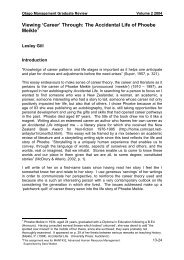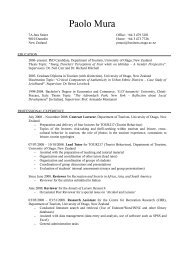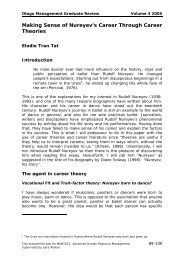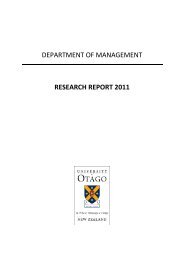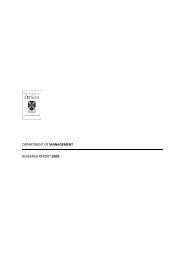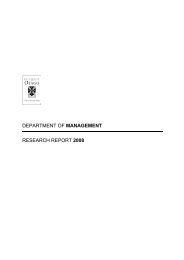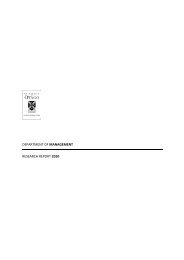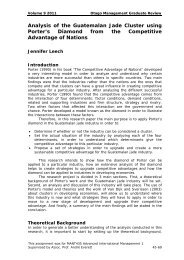at Otago - School of Business, University of Otago, New Zealand ...
at Otago - School of Business, University of Otago, New Zealand ...
at Otago - School of Business, University of Otago, New Zealand ...
You also want an ePaper? Increase the reach of your titles
YUMPU automatically turns print PDFs into web optimized ePapers that Google loves.
Uni Speak 101<br />
Even before you arrive <strong>at</strong> <strong>Otago</strong> you’ll encounter a new type <strong>of</strong> language th<strong>at</strong> is used on a daily basis<br />
on-campus. It’s English, but it can sometimes be confusing to understand if you’re new to the <strong>University</strong><br />
environment. Within this booklet you’ll read about majors, minors, undergradu<strong>at</strong>e, postgradu<strong>at</strong>e,<br />
prerequisites and many more terms you’ll need to understand.<br />
Below are some common terms and phrases<br />
associ<strong>at</strong>ed with studying <strong>at</strong> <strong>Otago</strong> th<strong>at</strong> are used<br />
throughout this booklet. Further terms and<br />
explan<strong>at</strong>ions can be found on page 52-53.<br />
100- 200- 300-level<br />
Levels identify how advanced a course is. A<br />
100-level paper is an introductory course and<br />
is where all first year students begin. You then<br />
progress to more advanced study <strong>at</strong> 200- and<br />
300-level. If for example you are a third year<br />
student you can complete papers <strong>at</strong> 100- 200-<br />
or 300- level provided you have completed the<br />
appropri<strong>at</strong>e prerequisites.<br />
Degree<br />
A degree is the qualific<strong>at</strong>ion th<strong>at</strong> most students<br />
complete while <strong>at</strong> <strong>University</strong>. If you are<br />
completing your first business qualific<strong>at</strong>ion<br />
then you will complete a Bachelor <strong>of</strong><br />
Commerce degree (BCom). The BCom is an<br />
undergradu<strong>at</strong>e degree th<strong>at</strong> usually takes three<br />
years to complete when studied full-time.<br />
More advanced business qualific<strong>at</strong>ions<br />
are referred to as postgradu<strong>at</strong>e degrees.<br />
Essentially this means you will need to have<br />
already gradu<strong>at</strong>ed with a BCom degree<br />
before undertaking advanced study – hence<br />
postgradu<strong>at</strong>e.<br />
Double degree<br />
A programme <strong>of</strong> study leading towards<br />
completing two degrees, e.g. a BA and BCom.<br />
Two full-time three-year degrees would<br />
normally take a total <strong>of</strong> six years if you studied<br />
them consecutively. By studying the two<br />
degrees as a double degree you can cross-credit<br />
points and complete both <strong>of</strong> them in four and<br />
a half or five years (full-time).<br />
Major<br />
A subject chosen as the main area <strong>of</strong> study for<br />
your bachelor’s degree (i.e. your chosen area<br />
<strong>of</strong> specialty such as Accounting). A major is<br />
studied up to 300-level.<br />
Double major<br />
Two subjects chosen as main areas <strong>of</strong> study in<br />
the same degree. For example, you complete a<br />
BCom and you major in Accounting and also<br />
Finance. Choosing two specialty areas instead<br />
<strong>of</strong> one does not increase the amount <strong>of</strong> time it<br />
will take to complete the degree.<br />
Minor<br />
A selection <strong>of</strong> papers in a particular subject<br />
area (normally involving approved papers<br />
studied <strong>at</strong> 200- and 300-level). You complete<br />
less papers in this subject when compared<br />
to those who are majoring in it, yet it can be<br />
acknowledged on your academic record in<br />
addition to your major.<br />
Papers<br />
The building blocks <strong>of</strong> your degree are called<br />
papers. A paper is a fixed course <strong>of</strong> work in<br />
certain aspects <strong>of</strong> a subject <strong>at</strong> a particular level.<br />
The first courses you take are called 100-level<br />
papers, for example, BSNS 106. You then move<br />
on to 200-level and 300-level papers. You will<br />
generally study seven or eight papers a year<br />
(three to four papers a semester).<br />
Paper Code<br />
Each <strong>University</strong> paper is identified by its<br />
subject code, a three-digit number and a<br />
subject name. For example, there is a first-level<br />
Tourism paper called TOUR 101 Principles<br />
and <strong>Business</strong> <strong>of</strong> Tourism Management. This<br />
paper is referred to as TOUR 101. Second-level<br />
papers are numbered in the 200s (e.g. TOUR<br />
211, TOUR 212 etc.) and third-level papers in<br />
the 300s.<br />
Points<br />
Each paper is worth a set number <strong>of</strong> points<br />
(or credits), and these contribute to the total<br />
required for a qualific<strong>at</strong>ion. A paper completed<br />
in one semester is usually worth 18 points. You<br />
need a total <strong>of</strong> 360 points to complete a BCom.<br />
If you successfully complete a paper you gain<br />
the full number <strong>of</strong> points associ<strong>at</strong>ed with it. If<br />
you fail to pass it you will not gain any points.<br />
Depending on your degree requirements you<br />
may be required to take the paper again until<br />
you pass it.<br />
Prerequisites and Corequisites<br />
A prerequisite is a paper you must complete<br />
before commencing a particular paper.<br />
Most papers beyond 100-level have<br />
prerequisites. If you have not completed a<br />
prerequisite for a paper, you are not normally<br />
permitted to enrol in th<strong>at</strong> paper. Some papers<br />
have corequisites. If you have not already<br />
passed a corequisite, you must take it <strong>at</strong> the<br />
same time as your other paper.<br />
9



